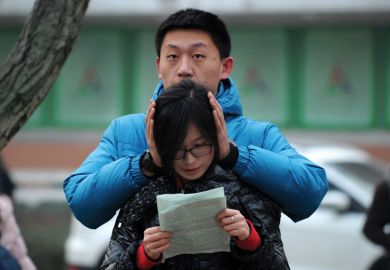Academics who return to China after studying abroad are more likely to be promoted to full professor than those who stay at home for their PhD, a study suggests.
But overseas returnees are less likely to secure senior positions above the rank of professor than China-educated PhDs, who are more trusted and have more time to work their way into social and professional networks that can lead to high-level promotions, the new analysis suggests.
Described as the first study of the impact of “guanxi” networks of Chinese social ties on academic promotion, the paper, published in Science Direct, analysed the career trajectory of 116 overseas-trained PhDs who started their first academic jobs in China between 2000 and 2010.
In looking at the CVs of these staff, all based in the maths and sociology departments of the 100 top universities selected for extra funding as part of a multibillion-dollar Chinese excellence initiative, researchers found a “positive significant effect for overseas returnees in advanced academic promotion to full professor”.
Foreign-educated PhDs were also more likely than domestic PhD graduates to get a job in the first place, as they could fill “structural holes” in a university’s workforce and tended to get promoted quicker to assistant professor.
However, that advantage ran out when it came to being promoted to top administrative posts, found the study, “Is it better to ‘Stand on Two Boats’ or ‘Sit on the Chinese Lap’?: Examining the Cultural Contingency of Network Structures in the Contemporary Chinese Academic Labor Market”, which was published last month.
There are “significant career advantages for overseas returnees for academic promotion to full professor in both regular and tenure-tracks”, state the authors Xiao Lu, from the Chinese Academy of Sciences’ Institutes of Science and Development, and Paul-Brian McInerney, a sociologist at the University of Illinois at Chicago.
But “overseas returnees lose this advantage when it comes to promotion to administrative positions”, the authors state.
“In other words, while ‘standing on two boats’ helps a returnee secure their first position, ‘sitting on the Chinese lap’ provides greater advantages for career advancement,” it concludes.
That finding appears to corroborate evidence of widespread “academic inbreeding” historically found in China, Japan and other countries in Southeast Asia, it says. For instance, a 2008 study found that 48 per cent of faculty hires in Beijing were internal – something the study attributes to China’s highly developed guanxi networks.
Locally based scholars benefited from access to these closed-off networks, as well as from “deeply-rooted trust and embeddedness within the institution [which] leads to faster promotion to administrative positions”.
It adds that although “domestically trained scientists and those aiming for more advanced promotions benefit more from network closure”, this may change as the growing number of expatriate scholars returning to China makes such preferment practices less acceptable.
Register to continue
Why register?
- Registration is free and only takes a moment
- Once registered, you can read 3 articles a month
- Sign up for our newsletter
Subscribe
Or subscribe for unlimited access to:
- Unlimited access to news, views, insights & reviews
- Digital editions
- Digital access to THE’s university and college rankings analysis
Already registered or a current subscriber?








